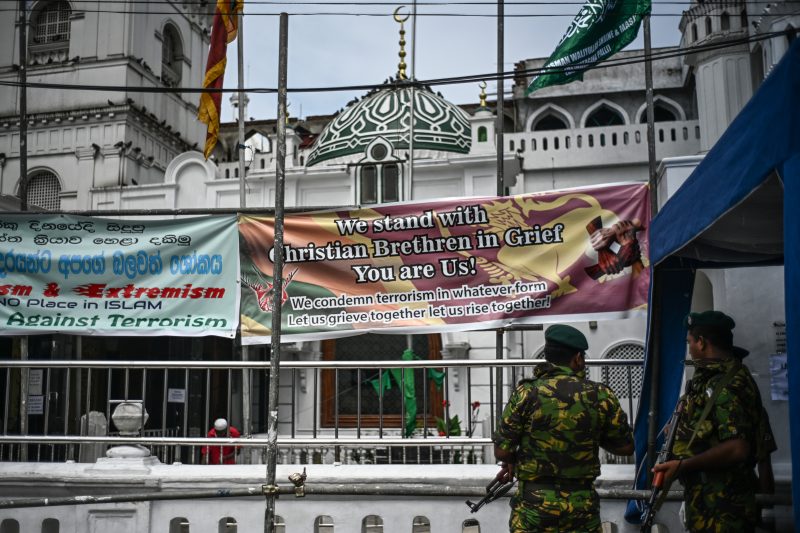Sri Lanka says radical leader killed in Easter hotel attack
Soldiers stand guard outside a mosque ahead of Friday noon prayers in Colombo as many Muslims fear retaliation for the Easter attacks (Jewel SAMAD)
Colombo (AFP) – An extremist leader at the heart of Sri Lanka’s Easter suicide bombings died in the attacks, the country’s president said Friday, as security forces guarded mosques for weekly prayers amid fears of reprisal strikes.
Security forces stepped up their searches for Islamists and raided a studio used by them to record a video pledge to Islamic State leader Abu Bakr al-Baghdadi before carrying out the deadly Easter attacks.
At least 253 people were killed and hundreds more injured when suicide bombers struck three churches and three luxury hotels in the island nation.
President Maithripala Sirisena told reporters that Zahran Hashim, head of a local extremist group, was killed at one of the Colombo hotels targeted.
“What intelligence agencies have told me is that Zahran was killed during the Shangri-La attack,” he said.
Hashim was accompanied by a second bomber identified as Ilham Ibrahim, Sirisena said.
Authorities had been desperately searching for Hashim after naming his group, National Thowheeth Jama’ath (NTJ), as the perpetrators of the attack.
DNA tests are being done on a severed head to conclusively establish that it is of Hashim’s, officials said, adding they believe the tests will prove positive.
Hashim, who founded the NTJ, appeared in a video released by the Islamic State group when it claimed the strikes. He is seen leading seven others in a pledge of allegiance to Baghdadi.
Police said they found the IS flag, the backdrop and the clothes the men wore for their video in the studio in the town of Sammanthurai, 370 kilometres (231 miles) east of the capital.
The discovery came as police and security forces pursued their hunt for Islamic extremists.
There were reports of explosions at another location in the same area where troops and a small group of militants exchanged fire for over an hour, military spokesman brigadier Sumith Atapattu said.
He said there were no fatalities among troops, but the area was still not cleared.
– Radicals hunted –
The government is on the defensive over its failure to heed a foreign intelligence warning that NTJ was planning suicide bombings on churches.
Police chief Pujith Jayasundara became the second major official to resign over the blunders, after top defence ministry official Hemasiri Fernando stepped down late Thursday.
Sri Lanka’s Catholic leader, Cardinal Malcolm Ranjith, the archbishop of Colombo, said he felt “betrayed” by the government’s failure to act on the warnings.
Late Friday, Sri Lankan Prime Minister Ranil Wickremesinghe apologised.
“We take collective responsibility and apologise to our fellow citizens for our failure to protect victims of these tragic events,” Wickremesinghe wrote on Twitter.
The military have poured troops onto the streets to back up police as they search for suspects using newly granted powers under a state of emergency.
At least 74 people are in custody, including a man believed to be the father of two of the bombers.
“We now have info that there are about 140 people in Sri Lanka linked to the Islamic State. We can and we will eradicate all of them very soon,” Sirisena said, announcing that there would also be new legislation to ban extremist groups.
Security was especially tight for weekly prayers in mosques, where attendance fell dramatically.
Armed police with sniffer dogs checked everyone entering major mosques.
Friday prayers at Dawatagaha Jumma Masjid in Colombo regularly attracts up to 700 worshippers, but only about 100 turned up this week, according to the mosque chairman Reyyaz Salley.
“We are sending a message to extremists that we will not be scared or deterred,” said Salley.
“But the main reason we are here is because we want to say a special prayer for the victims of the church bombings.”
– Tourism hit –
Dozens of foreigners died in the attacks and the government said Friday it expected the number of overseas tourists to fall by 30 percent this year, at a cost of $1.5 billion in revenues.
A global conference on wildlife trade — the annual meeting under the Convention on International Trade in Endangered Species (CITES) — had been due to take place in Sri Lanka in late May but has been postponed, officials said. No new date was given.
Finance Minister Mangala Samaraweera said the country — which depends on tourism as a cornerstone of its economy — could take up to two years to fully recover.
Several countries including Israel, Australia and Britain have warned their citizens against visiting Sri Lanka in the wake of the attacks.
Authorities reduced the death toll from 360 dead to 253, saying badly mutilated bodies were double counted.
Disclaimer: Validity of the above story is for 7 Days from original date of publishing. Source: AFP.


